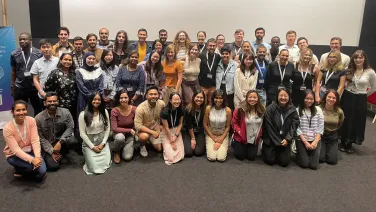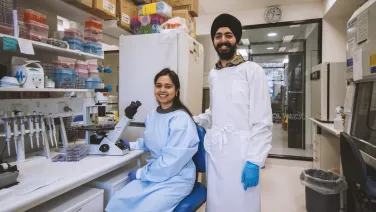
The Tscharke Group - Viruses and Immunity
Our research interests are Immunity to virus infection and in particular CD8+ T cells, poxviruses and herpesviruses and antigen presentation.
Research themes
About
The Tscharke Lab has interests in the pathogenesis and immunology of large DNA virus infections. Our research has three major themes:
1. Understanding herpes simplex virus latency, with a particular interest in viral and host gene expression during the latent phase of infection. Our hypothesis is that herpes simplex latency is more dynamic than previously appreciated and that the virus is under host control during this stage of infection rather than being entirely quiescent.
2. Quantitative studies of the presentation of viral antigens to the immune system (especially CD8+ T cells) during infection. Our interest here is in understanding how the levels of presentation relate to anti-viral immune responses and in turn how this information can be exploited in vaccine development.
3. Uncovering the roles of viral and host genes in viral pathogenesis. This includes studies of genes of vaccinia virus that might be an impediment to use of this virus as a vaccine vector, genes of herpes simplex virus that block antigen presentation and genes involved in effective host responses.
In addition, we are continually improving our research tools and methods. For example, incorporating CRISPR/Cas9 genome engineering methods in our methods in engineer the viruses we need for our investigations. Specific projects within this range are tailored to the interests of students.
Research interests
- Immunity to virus infection and in particular CD8+ T cells;
- Poxviruses and herpesviruses;
- Antigen presentation.
Recent grants
- NHMRC Investigator Grant (L2), GNT2008990, $2,072,570.00, D Tscharke Leadership Fellow. Title: Reducing the burden of DNA viruses on human health. 2022-2026.
- NHMRC Ideas Grant, GNT2003395, $800,085, DC Tscharke CIA, R Natoli CIB, U Schumann CIC. Title: Targeting miRNA biogenesis to treat herpes simplex virus latency. 2021-2023.
- MS Research Australia, Incubator Grant, $25,000, DC Tscharke CI, with co-applicants: G Grau, R Bowden, F Mash-Wakefield, S Hawke. Tracking safety and markers of response to Cladribine treatment. 2020-2021.
- ARC Discovery Project, DP190101325, $560,000, DC Tscharke CIA, SM Man CIB. Title: The cellular basis of sex-specific responses to virus infection. 2019-2022.
- CRC for Developing Northern Australia, CRC-P, $1.152m, Porosus Pty Ltd (Lead participant), Lagoon Crocodile Farm, Croc Pac Pty. Ltd., University of Queensland, LaTrobe University, ANU (DC Tscharke), Berrimah Veterinary Laboratories, James Cook University, Qld Dept of Health, NT Dept of Health. Title: Strategies to prevent two viruses devaluing Australian crocodile skins. 2018-2020.
- NHMRC Project Grant, GNT1126599, $981,000, DC Tscharke CIA, A Abendroth CIS, B Slobedman, CIC. Title: Understanding the role of ongoing viral activity in herpes simplex virus latency. 2017-2020.
- NHMRC Project Grant, GNT1084283, $1,114,125, DC Tscharke CIA, N La Gruta (U. Melb.) CIB, A Purcell (Monash) CIC, N Croft (Monash) CID. Title: Recognition of virus-infected cells by T cells. 2015-2019.
- UK Medical Research Council (MRC) Research Grant, £630.474, GL Smith, B Ferguson (DC Tscharke co-investigator); Understanding how innate immune evasion strategies affect adaptive immunity and the application to vaccine development. 2015-2018.
- NHMRC Project Grant, GNT1084342, $268,538, DC Tscharke (sole CI). Title: A humanised mouse model for herpes simplex virus pathogenesis. 2015-2017.










